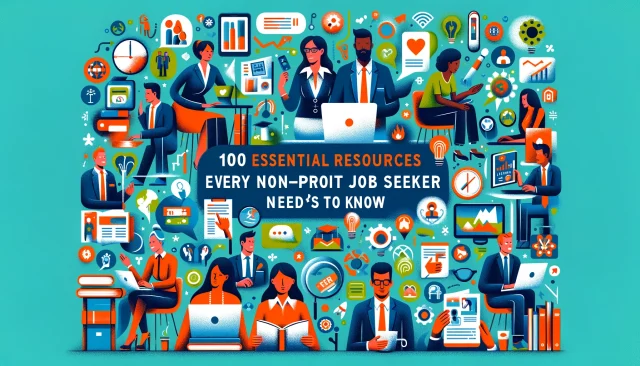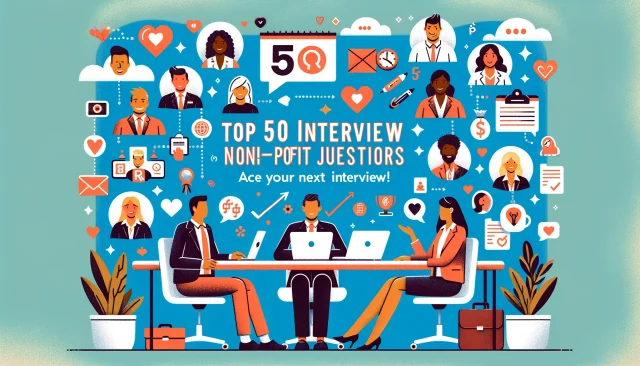Finding the right resources to navigate the non-profit job market can be challenging, but with the right guidance, it becomes much easier. At NonProfits.Club, our team has meticulously curated a list of the top 100 essential resources for non-profit job seekers. These resources were selected based on their relevance, usability, and impact on career development in the non-profit sector. Whether you are looking for job boards, training programs, or industry news, these resources will provide you with the tools and information you need to advance your career and make a meaningful impact.
Description: Idealist.org is a comprehensive job board dedicated to non-profit job seekers. It offers job listings, internships, and volunteer opportunities globally, making it an excellent resource for finding diverse roles in the non-profit sector. The platform also provides career advice and networking opportunities to help non-profit professionals advance their careers.
Description: NonProfitJobs.org focuses on job listings in the non-profit sector. It helps job seekers find roles that align with their skills and passions while providing valuable career resources and advice. This site is ideal for those looking to make a meaningful impact through their work in non-profits.
Description: The Chronicle of Philanthropy offers industry news, trends, and job listings for non-profit professionals. It provides in-depth articles and research on philanthropy and non-profit management, helping employees stay informed about the latest developments and opportunities in the sector.
Description: LinkedIn’s Non-Profit Job Board features job opportunities and networking for non-profit professionals. Users can connect with peers, join relevant groups, and access a vast array of job postings, making it a powerful tool for career growth and professional development.
Description: Work for Good specializes in job listings and career advice for non-profit job seekers. It helps connect professionals with meaningful work in non-profit organizations, offering resources to support career advancement and personal growth.
Description: The Bridgespan Group provides job board services and resources for non-profit management and leadership roles. It offers research, consulting services, and tools to help non-profits maximize their impact and effectiveness.
Description: Devex is a global platform offering non-profit job listings and career advice. It focuses on international development roles and provides news, funding opportunities, and professional development resources to help non-profit professionals advance their careers.
Description: Foundation List is a job board for foundation and non-profit jobs. It connects job seekers with opportunities in philanthropy and the non-profit sector, offering a variety of roles from entry-level to executive positions.
Description: The National Council of Nonprofits provides job listings and resources for non-profit professionals. It offers advocacy, research, and best practices to help non-profits operate more effectively and efficiently.
Description: Charity Village is a job board and career resource site for Canadian non-profit job seekers. It provides job listings, volunteer opportunities, and professional development resources, making it a valuable tool for those looking to build a career in the Canadian non-profit sector.
Description: Glassdoor offers company reviews, salary information, and job listings for non-profits. It helps job seekers make informed decisions by providing insights into workplace culture, compensation, and employee experiences.
Description: Idealware provides guides and resources on non-profit technology. It helps non-profit professionals understand and implement technology solutions to enhance their operations and achieve their missions.
Description: VolunteerMatch helps individuals find volunteer opportunities to gain experience and network within the non-profit sector. It offers a wide range of opportunities, making it a great resource for those looking to start or advance their non-profit careers.
Description: The Nonprofit Times provides industry news, job listings, and career resources for non-profit professionals. It offers in-depth articles, research, and advice on various aspects of non-profit management and operations.
Description: NonProfit Quarterly offers news, analysis, and career advice for non-profit professionals. It covers a wide range of topics, including governance, fundraising, and social justice, helping employees stay informed and engaged.
Description: The Alliance for Nonprofit Management provides resources for non-profit managers and job seekers. It offers training, research, and best practices to help non-profit professionals develop their skills and advance their careers.
Description: TechSoup provides technology resources and discounts for non-profits. It helps organizations access affordable software, hardware, and IT services, enabling them to operate more efficiently and effectively.
Description: Nonprofit Ready offers free online courses for non-profit professionals. It provides training on a variety of topics, including fundraising, project management, and leadership, helping individuals develop the skills needed to succeed in the non-profit sector.
Description: Candid provides resources on grants, funding, and non-profit management. It offers a wealth of information on philanthropic organizations and funding opportunities, helping non-profits secure the resources they need to achieve their missions.
Description: AFP offers resources for fundraisers and development professionals. It provides training, certification, and networking opportunities to help individuals advance their careers in fundraising and development.
Description: The Nonprofit Leadership Alliance offers education and certification programs for non-profit leaders. It provides training and resources to help individuals develop their leadership skills and advance their careers in the non-profit sector.
Description: NANOE is a membership organization that provides career resources for non-profit professionals. It offers training, certification, and networking opportunities to help individuals advance their careers and improve their organizations.
Description: BoardSource provides resources for non-profit boards and governance. It offers training, research, and best practices to help boards operate more effectively and support their organizations’ missions.
Description: GuideStar provides information on non-profit organizations and their performance. It helps donors, grantmakers, and non-profit professionals make informed decisions by providing transparency and data on non-profit operations.
Description: Blackbaud offers fundraising software and resources for non-profits. It provides tools and training to help organizations manage their fundraising efforts and maximize their impact.
Description: GrantSpace offers training and resources for grant seekers. It provides information on funding opportunities, grant writing, and non-profit management, helping organizations secure the resources they need to succeed.
Description: The Council on Foundations provides resources for foundation professionals. It offers training, research, and networking opportunities to help individuals advance their careers and improve their organizations’ impact.
Description: Human Rights Careers offers job listings and career advice in the human rights sector. It provides resources on education, internships, and job opportunities, helping individuals pursue careers in human rights.
Description: Bond provides resources for international development professionals. It offers training, research, and networking opportunities to help individuals and organizations improve their impact in international development.
Description: Philanthropy News Digest offers news and job listings for the philanthropic sector. It provides in-depth articles and research on philanthropy, helping non-profit professionals stay informed and connected.
Website: ynpn.org
Description: YNPN provides networking and career development for young non-profit professionals. It offers events, resources, and support to help individuals build their careers and make a meaningful impact.
Description: The Fundraising Authority offers resources and advice for fundraising professionals. It provides training, tips, and best practices to help individuals and organizations improve their fundraising efforts.
Description: Social Sector Jobs is a job board for social impact and non-profit roles. It connects job seekers with opportunities in the social sector, helping them find meaningful work that aligns with their values.
Description: Nonprofit HR provides human resources consulting and job listings for non-profits. It offers resources on talent management, recruitment, and employee engagement, helping non-profits build strong teams.
Description: Third Sector offers news and resources for UK non-profit professionals. It provides articles, research, and job listings to help individuals stay informed and advance their careers.
Description: OneWorld.net provides job listings and resources for international development. It offers information on global issues, funding opportunities, and career advice, helping individuals pursue careers in international development.
Description: Global Jobs offers international non-profit job listings. It connects job seekers with opportunities in international development, humanitarian aid, and global health, helping them find roles that make a difference.
Description: MissionBox provides resources and articles for non-profit professionals. It offers information on best practices, funding, and program management, helping organizations improve their impact.
Description: The NonProfit Network offers job board and resources for non-profit job seekers. It provides career advice, job listings, and networking opportunities to help individuals find fulfilling roles in the non-profit sector.
Description: Pro Bono Australia provides job board and resources for Australian non-profit professionals. It offers job listings, news, and career advice, helping individuals advance their careers and make a positive impact.
Description: Inside Philanthropy offers news and insights on philanthropy and non-profits. It provides in-depth articles and research on funding trends, helping non-profit professionals stay informed and connected.
Description: Civil Society Jobs is a UK-based job board for non-profit roles. It connects job seekers with opportunities in the charity sector, helping them find meaningful work.
Description: The Muse offers career advice and job listings, including non-profits. It provides articles, company profiles, and job search tips, helping individuals find and pursue fulfilling careers.
Description: Social Good Jobs is a job board for social impact and non-profit roles. It connects job seekers with opportunities that align with their values and passions, helping them find meaningful work.
Description: The Nonprofit Law Blog provides legal advice and resources for non-profit professionals. It offers articles on governance, compliance, and best practices, helping organizations navigate legal challenges.
Description: NASW offers job board and resources for social workers. It provides information on licensure, continuing education, and career development, helping social workers advance their careers.
Description: Philanthropy Australia provides resources for the Australian philanthropic sector. It offers job listings, news, and research on philanthropy, helping non-profit professionals stay informed and connected.
Description: The Council of Nonprofits offers advocacy and resources for non-profit organizations. It provides information on policy, best practices, and funding, helping non-profits operate more effectively.
Description: Justmeans provides news and jobs in corporate social responsibility and sustainability. It offers articles on best practices, funding opportunities, and career advice, helping non-profit professionals stay informed and connected.
Description: CharityJob is a UK-based job board for non-profit roles. It connects job seekers with opportunities in the charity sector, helping them find meaningful work that aligns with their values.
Description: Change.org Careers offers job listings at Change.org and other advocacy organizations. It provides opportunities for individuals passionate about social change and advocacy, helping them find roles that make a difference.
Description: Causeartist provides resources and job listings for social entrepreneurs. It offers articles on social impact, funding, and best practices, helping individuals build careers in social entrepreneurship.
Description: Conservation Job Board offers job listings for conservation and environmental roles. It connects job seekers with opportunities to protect and preserve the environment, helping them find meaningful work in conservation.
Description: DevelopmentAid provides job board for international development professionals. It offers information on funding, projects, and career advice, helping individuals advance their careers in international development.
Description: DevNetJobs.org offers international development job listings. It connects job seekers with opportunities in development, humanitarian aid, and global health, helping them find roles that make a difference.
Description: Environmental Career Center provides job listings for environmental roles. It connects job seekers with opportunities to protect and preserve the environment, helping them find meaningful work in the environmental sector.
Description: Ethical Jobs is an Australian job board for social impact roles. It connects job seekers with opportunities that align with their values and passions, helping them find meaningful work in the social impact sector.
Description: Foundation Center provides resources on grants and funding for non-profits. It offers a wealth of information on philanthropic organizations and funding opportunities, helping non-profits secure the resources they need to achieve their missions.
Description: GiveGab offers fundraising platform and resources for non-profits. It provides tools and training to help organizations manage their fundraising efforts and maximize their impact.
Description: GoAbroad.com provides international volunteer and job opportunities. It connects job seekers with opportunities to gain experience and make a difference abroad, helping them find meaningful work in international development.
Description: Good Jobs First provides resources on accountable development and subsidies. It offers information on best practices, funding opportunities, and career advice, helping non-profit professionals stay informed and connected.
Description: GoodWork is a Canadian job board for green and social impact jobs. It connects job seekers with opportunities that align with their values and passions, helping them find meaningful work in the social impact sector.
Description: Grant Professionals Association offers resources and certification for grant professionals. It provides training, networking opportunities, and career advice, helping individuals advance their careers in grant writing and management.
Description: Grassroots Jobs is a job board for grassroots organizations and campaigns. It connects job seekers with opportunities to work on social justice and advocacy issues, helping them find meaningful work in grassroots organizations.
Description: Humentum provides resources and training for international development professionals. It offers information on best practices, funding opportunities, and career advice, helping individuals advance their careers in international development.
Description: Impactpool offers job board for social impact and international development roles. It connects job seekers with opportunities to make a difference globally, helping them find meaningful work in the social impact sector.
Description: InterAction provides resources for international development and humanitarian professionals. It offers information on best practices, funding opportunities, and career advice, helping individuals advance their careers in international development.
Description: Interfaith Worker Justice offers job listings and resources for worker justice organizations. It provides information on best practices, funding opportunities, and career advice, helping individuals advance their careers in worker justice.
Description: Intern Abroad HQ provides international internships in non-profits and social impact. It connects job seekers with opportunities to gain experience and make a difference abroad, helping them find meaningful work in international development.
Description: IAVE offers resources for volunteer managers. It provides information on best practices, funding opportunities, and career advice, helping individuals advance their careers in volunteer management.
Description: IYF provides job listings and resources for youth development professionals. It offers information on best practices, funding opportunities, and career advice, helping individuals advance their careers in youth development.
Description: Localwise is a job board focused on local businesses and non-profits. It connects job seekers with opportunities to work in their communities, helping them find meaningful work that aligns with their values.
Description: Mac’s List offers job board and career resources for Oregon and Washington. It provides job listings, career advice, and networking opportunities, helping individuals find fulfilling work in the non-profit sector.
Description: Microfinance Gateway provides job listings and resources for microfinance professionals. It offers information on best practices, funding opportunities, and career advice, helping individuals advance their careers in microfinance.
Description: MNN offers job board and resources for Minnesota non-profits. It provides job listings, career advice, and networking opportunities, helping individuals find fulfilling work in the non-profit sector.
Description: The National Center for Family Philanthropy provides resources for family foundations. It offers information on best practices, funding opportunities, and career advice, helping individuals advance their careers in family philanthropy.
Description: The National Network for Social Work Managers offers job board and resources for social work managers. It provides information on best practices, funding opportunities, and career advice, helping individuals advance their careers in social work management.
Description: The Nonprofit Finance Fund provides financial consulting and resources for non-profits. It offers information on best practices, funding opportunities, and career advice, helping organizations manage their finances and achieve their missions.
Description: NTEN offers resources and job listings for non-profit tech professionals. It provides information on best practices, funding opportunities, and career advice, helping individuals advance their careers in non-profit technology.
Description: On Purpose offers career change programs for professionals moving into social impact. It provides information on best practices, funding opportunities, and career advice, helping individuals transition into meaningful work in the social impact sector.
Description: Opportunity Knocks is a job board for non-profit jobs. It connects job seekers with opportunities in the non-profit sector, helping them find meaningful work that aligns with their values.
Description: Peace Corps Careers offers job listings and resources for returned Peace Corps volunteers. It provides information on best practices, funding opportunities, and career advice, helping individuals transition into meaningful work after their Peace Corps service.
Description: Philanthropy New York provides resources and job listings for the philanthropic community in New York. It offers information on best practices, funding opportunities, and career advice, helping individuals advance their careers in philanthropy.
Description: Public Allies offers job listings and resources for public service professionals. It provides information on best practices, funding opportunities, and career advice, helping individuals advance their careers in public service.
Description: Root Cause provides resources and consulting for non-profit effectiveness. It offers information on best practices, funding opportunities, and career advice, helping organizations improve their impact.
Description: Service Year Alliance offers job listings and resources for service year programs. It provides information on best practices, funding opportunities, and career advice, helping individuals find meaningful work in service year programs.
Description: The Society for Nonprofits offers resources, training, and job listings for non-profit professionals. It provides information on best practices, funding opportunities, and career advice, helping individuals advance their careers in the non-profit sector.
Description: The Stanford Social Innovation Review offers articles and resources on social innovation. It provides information on best practices, funding opportunities, and career advice, helping individuals advance their careers in social innovation.
Description: TFA Careers offers job listings and resources for education professionals. It provides information on best practices, funding opportunities, and career advice, helping individuals advance their careers in education.
Description: The Bridgespan Group provides job board and resources for non-profit management roles. It offers information on best practices, funding opportunities, and career advice, helping individuals advance their careers in non-profit management.
Description: The Management Center offers resources and training for non-profit managers. It provides information on best practices, funding opportunities, and career advice, helping individuals advance their careers in non-profit management.
Description: The Urban Institute provides research and resources for non-profit organizations. It offers information on best practices, funding opportunities, and career advice, helping organizations improve their impact.
Description: Third Sector New England offers job board and resources for New England non-profits. It provides job listings, career advice, and networking opportunities, helping individuals find fulfilling work in the non-profit sector.
Description: The Tides Foundation provides resources and job listings for philanthropic organizations. It offers information on best practices, funding opportunities, and career advice, helping individuals advance their careers in philanthropy.
Description: Volunteer Canada offers resources and job listings for volunteer management. It provides information on best practices, funding opportunities, and career advice, helping individuals advance their careers in volunteer management.
Description: The Women’s Philanthropy Institute provides resources and research on women’s philanthropy. It offers information on best practices, funding opportunities, and career advice, helping individuals advance their careers in women’s philanthropy.
Description: Work for Progress offers job listings for advocacy and social change roles. It connects job seekers with opportunities to work on social justice and advocacy issues, helping them find meaningful work in advocacy organizations.
Description: YNPN provides networking and career development for young non-profit professionals. It offers events, resources, and support to help individuals build their careers and make a meaningful impact.
Description: YouthBuild USA offers job listings and resources for youth development professionals. It provides information on best practices, funding opportunities, and career advice, helping individuals advance their careers in youth development.
Description: ZipRecruiter is a job board with non-profit job listings. It connects job seekers with opportunities in the non-profit sector, helping them find meaningful work that aligns with their values.
With these 100 essential resources at your fingertips, you’re well-equipped to explore and thrive in the non-profit sector. Each resource offers unique opportunities to enhance your skills, find job openings, and stay informed about industry trends. At NonProfits.Club, we are committed to supporting your journey in the non-profit world. Don’t miss out on the latest updates and career tips—join our community today and take the next step toward a fulfilling and impactful career in the non-profit sector. Visit NonProfits.Club now to get started!































